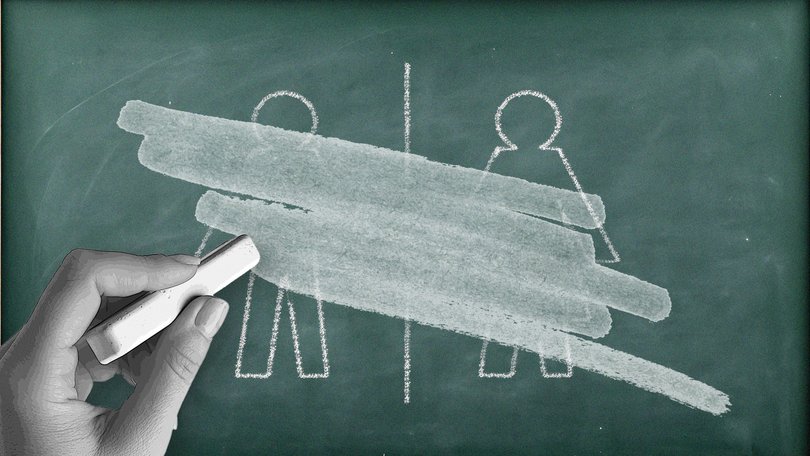JENI O’DOWD: ‘Boys and girls’ ban sought by Australian teachers as kids remain illiterate, all for inclusivity
JENI O’DOWD: An Aussie teachers’ federation wants to ban the term ‘boys and girls’ and replace it with ‘epic humans’... this is not satire, it’s woke madness.

Eminem? Empathetic Wordsmith. Footy coaches? Feelings-First Motivators. Anthony Albanese? Epic Human-in-Chief of Saying Nothing Useful.
This is the Australia we’re building, one “epic human” at a time. And while it sounds like satire, sadly, it isn’t.
The NSW Teachers Federation wants teachers to stop saying “boys and girls” in classrooms, replacing it with “epic and awesome humans,” “future leaders”, or “superstars”.
Sign up to The Nightly's newsletters.
Get the first look at the digital newspaper, curated daily stories and breaking headlines delivered to your inbox.
By continuing you agree to our Terms and Privacy Policy.According to the union’s quarterly journal, this “inclusive language” is meant to ensure no student feels left out. Because, in 2025, reality itself is too offensive for the delicate sensibilities of our kids.
It would be funny if it weren’t so depressingly typical of the way our education debate gets hijacked by the terminally self-righteous.
And this isn’t a one-off. It’s part of an entire bureaucratic industry devoted to policing how you speak, not what you mean.
Universities are busy issuing “trigger warnings” before lectures on law and literature. Hospitals debate whether “breastfeeding” should be replaced with “chestfeeding”. Corporate HR manuals tell staff to avoid “hey guys” in meetings.
Cricket Australia replaced “batsman” with “batter,” while school guidelines in the US advise teachers to avoid “mom and dad” in favour of “grown-ups” or “parents and guardians”.
All of it has the same underlying message: if we can just tinker with the words, maybe we won’t have to deal with reality.
In the real world, our education system is struggling with actual, measurable and devastating failures.
According to 2024 NAPLAN data, one in three Australian students is falling below proficiency in literacy and numeracy.
And as the Grattan Institute points out, in an average class of 24, eight kids can’t read well.
“Australia has a reading problem. A third of our children can’t read proficiently,” it says in the 2024 Reading Guarantee report.
“Australia is failing these children. And it’s a preventable tragedy. The reason most of those students can’t read well enough is that we aren’t teaching them well enough.
“Students who don’t learn to read well are more likely to fall behind in school, disrupt their classes, drop out, struggle to find work and end up in the criminal justice system.”
If that’s not a warning to change teaching methods, I don’t know what is.
But rather than focus energy on that crisis, the union that represents our teachers is urging them to spend time policing their greetings. Heaven forbid you say “boys and girls” instead of “epic humans”.
And it’s not the first time the union has focused on anything except teaching. They’ve campaigned to scrap NAPLAN (one of the few diagnostic tools for spotting kids who are falling behind), fought phonics screening, consistently opposed paying great teachers more and even voted on foreign policy motions at their conferences.
This is just their latest piece of woke madness. Less than 1 per cent of Australians identify as trans or gender-diverse. Yet millions are being taught to police their everyday words to accommodate a statistically tiny group. That’s just absurd.
If you want a snapshot of why parents are losing faith in the education system, this is it.
It’s a special kind of bureaucratic decadence to obsess over words while presiding over a system where one in three students can’t read at grade level.
This union-endorsed vocabulary makeover is the participation trophy of education policy. It’s the triumph of pretending that if we just talk nicely enough, the complex problems will go away.
Guess what? They won’t.
Meanwhile, Education Minister Jason Clare is tackling serious issues, pushing for education against racism and anti-Semitism in the school curriculum.
The serious challenges in our education system require something much less fashionable than rebranding kids as “epic humans”.
They require phonics. Explicit teaching. Teacher training. Time. Money. And above all, the humility to admit that the current system is failing.
You don’t fix a literacy crisis by pretending Year 9 woodwork students are “Future Nobel Laureates in Timber Studies”. You fix it by teaching them to read, write and solve maths equations.
The next time someone proposes another “inclusive language” guideline, ask them one question: How’s that helping the eight kids in every classroom who can’t read?
Because if you don’t have an answer, you’re not solving the problem. You’re part of it.
